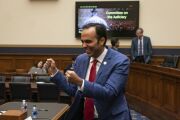
The Consumer Financial Protection Bureau has rescinded a pair of regulatory filings, including a proposed rule on nonsufficient funds fees and an advisory opinion on earned wage access products. The notices of rescission were published in the Federal Register this week.
CFPB Director Rohit Chopra, who may just have days left on the job, said he was using his discretion "to withdraw the proposed rule on NSF fees," which was published in the Federal Register on Tuesday. Proposed rules can be withdrawn at any time before they are finalized.
The NSF
The bureau received more than 8,000 comments on the proposal, but was not able to finalize the rule despite Chopra issuing a flurry of actions ahead of the changeover to the Trump administration on Jan. 20.
The CFPB said that it "has determined that it would be a prudent use of its rulemaking and market monitoring resources to withdraw this rulemaking and consider whether consumers similarly lack understanding of other NSF fees to determine whether a broader rulemaking would be appropriate."
Commenters had challenged the proposal's analysis of the CFPB's statutory authority on abusive conduct, the application of that authority to NSF fees and the potential cost of the rule, even to institutions that do not charge NSF fees. The bureau said in its NSF fees proposal that the fees are "a significant source of fee revenue" for banks, though some financial institutions have voluntarily stopped charging the fees.
In addition, the CFPB rescinded an advisory opinion issued by former CFPB Director Kathy Kraninger in 2020 on paycheck advances — known as earned wage advances. The CFPB called the opinion "seriously flawed," claiming it was limited to products that were completely free, often provided by employers as a perk for employees.
Though some employers cover the cost of a paycheck advance, most consumers pay fees such as expedited fees, which the industry calls "tips" or "donations," to fintech providers.
In July, the CFPB proposed an
The CFPB said the 2020 advisory opinion's analysis — by its own attorneys but under a Republican director — "engendered substantial regulatory uncertainty."
Regulators, policymakers and industry and consumer advocates are still debating






